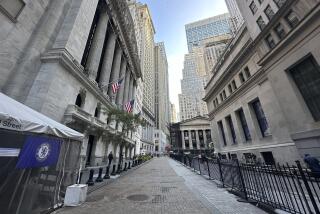Greenspan Says He’s Not Putting Stocks Down
WASHINGTON — Federal Reserve Board Chairman Alan Greenspan on Wednesday defended his recent cautionary comments about the stock market’s record climb, but appeared to backpedal somewhat from previously stern remarks.
The Fed chief, who fretted last week about possible “excessive optimism” among investors and in December jolted markets by raising the question of “irrational exuberance” in prices of financial assets, insisted Wednesday that he is not trying to jawbone stocks lower and couldn’t do so even if he wanted to.
“We have a very complex international market system with millions of players in the game,” Greenspan told a House committee, in the second part of his report to Congress on the economy. “There is no way you can talk down or talk up prices or interest rates.”
Importantly, he also insisted that the Fed would not use its power to raise short-term interest rates solely to “prick” a stock market bubble.
His comments helped spark a broad rally on Wall Street, sending the Dow Jones industrials up 93.13 points to 6,945.85.
The Fed chief’s previous warnings about the dangers of a high-flying stock market brought charges Wednesday that he was “meddling” in the free market.
“Why are you, as a central banker, commenting on the stock market?” Rep. Carolyn Maloney (D-N.Y.) asked Greenspan. “I have never heard of any other central bankers doing that.”
Greenspan said rising stock prices are among a number of factors the Fed watches to determine whether inflation is becoming a threat. “It is not a stock market issue we are involved with,” he said.
Earlier Wednesday, in a speech to business economists, Greenspan acknowledged that he is not sure where the stock market is headed. “I don’t know what the stock price outlook is,” he said.
If Wall Street analysts’ forecasts of corporate earnings are right, then the stock market is properly priced, he said. But if they are not, the market is in for some problems.
“It’s pretty obvious that if you look at a normal pricing model for stocks, what you get is a not unreasonable level of prices if the earnings forecasts which the analysts are publishing are accurate,” Greenspan said.
The accuracy of those earnings forecasts in turn hinges on whether corporate profit margins continue to rise. Margins are “quite high” when compared with 1991, but are significantly below levels that prevailed in the 1960s, when inflation was last near current low levels, he said.
“Is it possible for margins to rise further?” Greenspan asked. “It certainly is. If, however, profit margins . . . don’t go any further, then the market will run into some difficulty.”
Greenspan told economists that markets, especially the stock market, very rarely “peak out” in response to any particular event.
“What tends to happen is that everyone gets increasingly bullish and everyone is committed and there’s no one left to buy when somebody wants to sell,” he said.
Greenspan argued that the Fed needs to take account of what he called “balance sheet forces” because of their increasing importance in trying to gauge the future direction of the economy.
BLUE CHIPS SOAR
Dow industrials rose 93 points. D5
(BEGIN TEXT OF INFOBOX / INFOGRAPHIC)
Then and Now: Fed Chief on the Market
The warnings ...
* Dec. 5 speech to American Enterprise Institute for Public Policy Research:
“How do we know when irrational exuberance has unduly escalated asset values, which then become subject to unexpected and prolonged contractions as they have in Japan over the past decade? And how do we factor that assessment into monetary policy?”
* Senate testimony on Feb. 26:
“History demonstrates that participants in financial markets are susceptible to waves of optimism, which can in turn foster a general process of asset-price inflation that can feed through into markets for goods and services. Excessive optimism sows the seeds of its own reversal in the form of imbalances that tend to grow over time.... History counsels caution.”
... and now, backpedaling?
* Speech on Wednesday to National Assn. of Business Economists:
“If you look at a normal pricing model for stocks, what you get is a not unreasonable level of prices if the earnings forecasts which the analysts are publishing are accurate.”
* House testimony on Wednesday:
“It is not a stock market issue we are involved with.... We don’t view monetary policy as a tool to prick the stock market bubble.”
Source: Times reports
More to Read
Inside the business of entertainment
The Wide Shot brings you news, analysis and insights on everything from streaming wars to production — and what it all means for the future.
You may occasionally receive promotional content from the Los Angeles Times.










